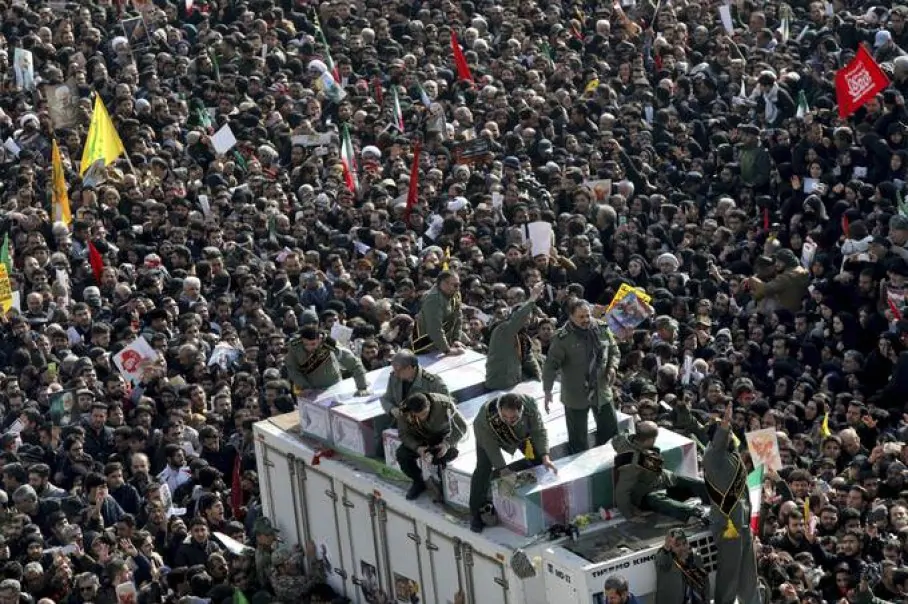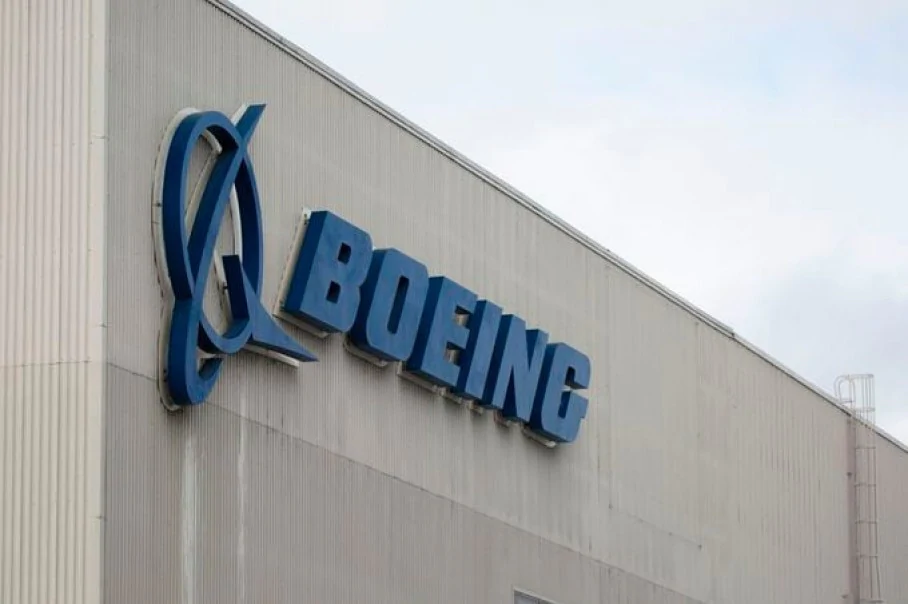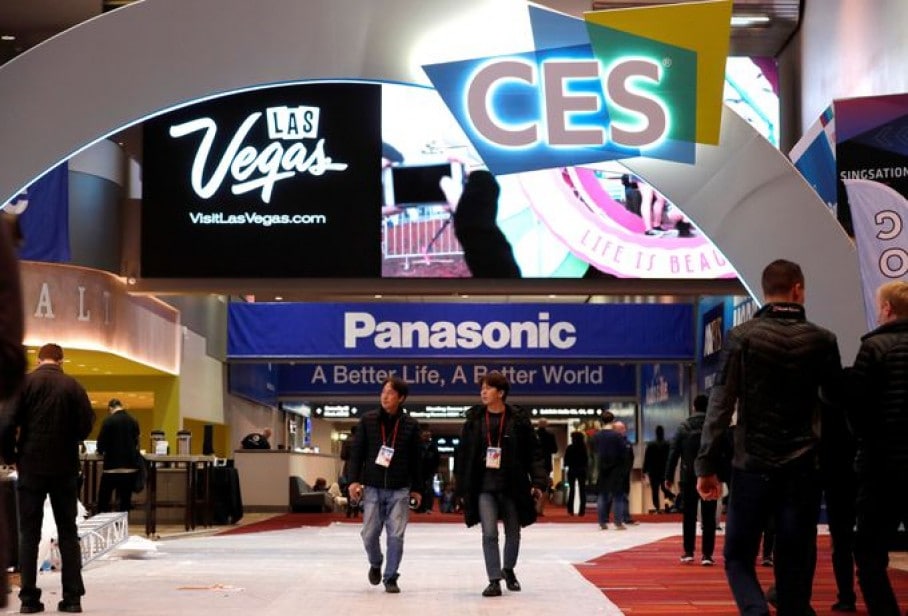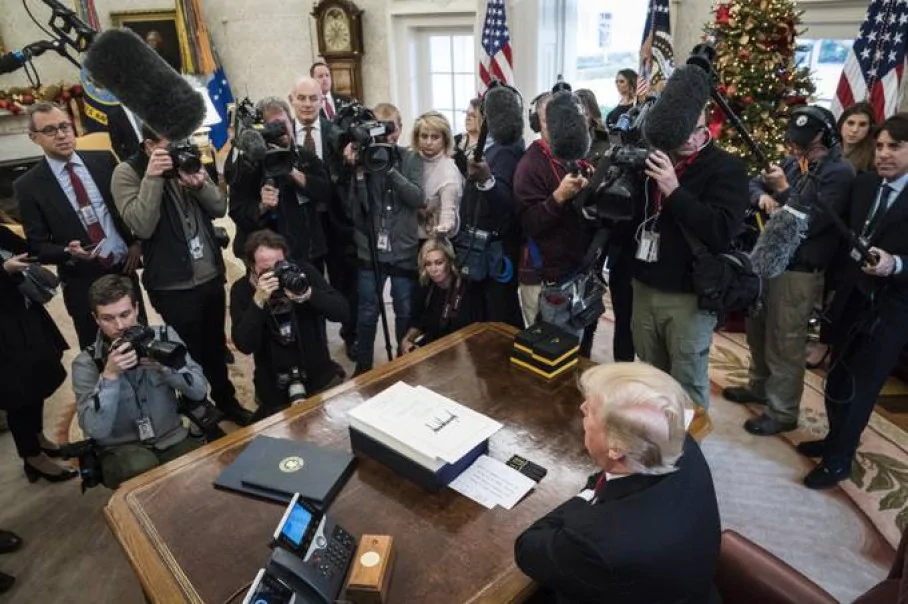THE TICKER

Coffins of Gen. Qassem Soleimani and others who were killed in Iraq by a U.S. drone strike, are carried on a truck surrounded by mourners during a funeral procession in Tehran. (AP Photo/Ebrahim Noroozi)
The new year is already bringing new threats to fray nerves from C-suites to Wall Street: Just as the the U.S.-China trade war cools off, the risk of a hot war with Iran is spiking.
But the economic impact of an escalating conflict in the Middle East remains far from clear. Economists — for now, at least — appear to agree that a limited military confrontation wouldn’t mean much to U.S. growth.
“The economic and financial fall-out from Friday’s events seems likely to be minor,” Macroeconomic Advisors economists wrote, referencing the U.S. military drone attack that killed Iranian Maj. Gen. Qasem Soleimani at the Baghdad airport. In response, the Iranian regime has announced it is suspending its commitments under the 2015 nuclear deal and will attack military sites.
“The direct economic impact would be on the collective psyche, equity prices and oil prices,” Ryan Sweet, director of real-time economics at Moody’s Analytics, writes. “By itself, a military conflict between the U.S. and Iran would have modest implications for the U.S. economy, but the spillover impact on oil prices could be more significant.”
Indeed, oil prices are already jumping on fears that Middle Eastern infrastructure will get caught in the crossfire. But even unraveling what a sustained increase in the cost of the commodity will mean at home is debatable.
“Higher oil prices represent a tax on oil consumers and a windfall for producers,” Pantheon Macroeconomics chief economist Ian Shepherdson writes. “World oil consumption is about 100M barrels per day, so each five dollars on the price of oil is equivalent to an annualized tax of about $183B per year, or 0.1% of global GDP.”

Aramco oil company employees at Saudi Arabia’s Abqaiq oil processing plant. (Fayez Nureldine / AFP)
But since the United States is now both a major oil producer and consumer, higher oil prices could benefit the economy by encouraging the domestic energy sector to invest in expanding its capacity. That dynamic has played out over the past half-decade. “When oil prices collapsed between spring 2014 and early 2016, the ensuing plunge in capital spending in the oil sector outweighed the boost to consumers from cheaper gasoline and heating oil, and overall economic growth slowed markedly,” Shepherdson writes. “This story played out in reverse when oil prices rebounded in the three years through spring 2018, and economic growth picked up.”
Consumers — the primary engine of American economic growth — should be able to withstand the pinch of higher prices at the pump in the immediate term, per Michael Pearce, senior U.S. economist for Capital Economics. “Labor market conditions remain solid, the household saving rate is elevated, and consumer confidence remains high,” he writes.
And the Federal Reserve is unlikely to change its outlook based on escalating tensions, per a note from Larry Meyer, a former Fed governor and founder of Washington-based research firm LH Meyer. The conflict is not “anywhere close” to weighing on Fed policymaking “at this point,” he writes.
Then again, the picture could change if the conflict snowballs into a full-scale war. “The wild card is whether turmoil in the Middle East triggers a sustained sell-off in equities, depressing business and consumer confidence to the point where labor market and inflation concerns become secondary,” Shepherdson writes. “We’d be surprised — the drop in the S&P on Friday was just the initial knee-jerk response — but if Iran takes more drastic action than we are expecting, it will become a real risk.”
Or as Fundstrat analyst Vito Racanelli puts it, “Once hostilities begin, predictions go out the window.”
MARKET MOVERS

Former Federal Reserve Chairman Ben Bernanke. (Reuters/Christopher Aluka Berry)
— Bank failures have dropped. It could be a red flag. WSJ’s Andrew Ackerman: “Times are good for U.S. banks. The industry is highly profitable, lending is up and the number of problem institutions—those found to have deficiencies in their businesses—is the lowest since early 2007, according to the Federal Deposit Insurance Corp.
Unusually, not a single bank failed in 2018, and just four small lenders have gone under since the end of May 2019. Yet some bank analysts and former regulators say the very paucity of failures may be a sign that hidden risks are building. ‘It’s in the good times, when things seem very calm and when there are no bank failures, that the bad loans are made,’ former FDIC Vice Chairman Thomas Hoenig said in a recent interview.”
— Central bankers say interest rates could drop further. Bloomberg News’s Rich Miller and Christopher Condon: “The already low level of interest rates in the U.S. and the rest of the industrial world could fall further, three senior central bankers said on Sunday. Speaking at the American Economic Association’s annual meeting, Federal Reserve Bank of New York President John Williams, European Central Bank chief economist Philip Lane, and Bank of England Deputy Governor Ben Broadbent all saw a possibility that so-called R star — the neutral level of interest rates that neither spurs nor restricts growth in their economies — might drop in the future.”
Bernanke: Fed has tools for another downturn. NYT’s Jeanna Smialek, Jim Tankersley and Ben Casselman: “Ben S. Bernanke, the former Federal Reserve chair, said on Saturday that the types of extraordinary steps the Fed employed to help pull the economy out of the Great Recession should make up for the central bank’s limited room to cut interest rates in the event of another downturn — but that is contingent on a big ‘if.’
“As long as the neutral interest rate — the setting at which Fed policy neither stokes nor slows growth — remains from 2 percent to 3 percent counting inflation, the Fed should be able to rely on tactics like snapping up bonds and promising to keep rates low in the event of another recession. But the neutral rate has been creeping lower for decades, dragged down by powerful and slow-moving forces like population aging. Should it continue to fall, the tricks Mr. Bernanke and his Fed used to coax the economy back from the brink in the 2007 to 2009 recession might prove insufficient.”
— Tab for damage from Australian fires mounts. WSJ’s Stephen Wright: “The human, environmental and economic toll of Australia’s devastating wildfires is mounting each day, but the country has barely begun to grasp the total cost of the ‘unprecedented’ blazes and how it will change the way people live… Australia’s insurance council says more than $260 million worth of claims have been lodged since Nov. 8, when it declared a catastrophe, but that represents a trickle of what is to come. Another $39 million in claims were lodged before Nov. 8 for fires in September and October.”
TRUMP TRACKER
TRADE FLY-AROUND:

Chinese and U.S. flags. (Jason Lee/Reuters)
— Chinese delegation reportedly headed to D.C.: “The Chinese trade delegation tentatively plans to travel to Washington on January 13 for the signing of the phase one agreement that would herald a truce in the costly trade war between the world’s two largest economies. They will return on January 16, a source briefed on the matter has told the South China Morning Post,” SCMP’s Zhou Xin reports.
“The Chinese delegation, led by vice-premier Liu He, had originally planned to set off earlier in the month but had to change their travel schedule after [President Trump] sent a surprising tweet on New Year’s Eve claiming that he would sign the deal with ‘high representatives’ from Beijing on January 15 in the White House. While the two sides had been expected to wrap up their phrase one negotiations by January, the Chinese had not expected the US leader to make a unilateral announcement about the date or that he would be willing to sign the deal even if President Xi Jinping was not available.”
— Trade war yields a windfall for lobbyists. ProPublica’s Lydia DePillis: “Constantly up-in-the-air trade agreements and the byzantine, opaque exclusion process has been a blessing for one set of players: Washington’s influence industry, including the firms of former Trump officials and allies like inauguration committee chief Brian Ballard, former White House chief of staff Reince Priebus and Trump fundraiser Marc Lampkin.
“Ballard was once Trump’s lobbyist in Florida. He’s since been dubbed “the most powerful lobbyist in Trump’s Washington.” A cancer therapy firm, Varian Medical Systems, paid Ballard and a colleague $540,000 to lobby the White House, the trade office and Vice President Mike Pence on trade issues, filings show. The outreach included a meeting with Trump’s director of trade and manufacturing policy, Peter Navarro. Since then, four of Varian’s five exclusion requests have been approved — which, the company said in an SEC filing, boosted revenues by $23 million.”
IMPEACHMENT MINUTE: A speed read on the latest from the congressional impeachment process.
“Top Republican suggests changing Senate rules to begin Trump impeachment trial within days.” By The Post’s Rachael Bade
“Iran Uncertainty Grips Congress as Impeachment Looms.” By the New York Times’s Nicholas Fandos and Catie Edmondson
POCKET CHANGE

The Boeing logo at a company factory in Renton, Wash. (Jason Redmond/AFP/Getty Images)
— New year, more hurdles for 737 Max: “Federal aviation regulators are considering mandatory flight-simulator training before U.S. pilots can operate Boeing Co.’s 737 MAX jets again, according to government and industry officials familiar with the deliberations, a change that would repudiate one of the plane maker’s longstanding arguments,” the Wall Street Journal’s Andy Pasztor and Andrew Tangel reports.
“The Federal Aviation Administration months ago rejected the idea — which would entail extra costs and delays for airlines — as unnecessary. But in recent weeks, these officials said, requiring such training before returning the grounded U.S. MAX fleet to the air has gained momentum among agency and industry safety experts. … The FAA’s formal decision isn’t expected until February or later, and the situation remains fluid. An agency spokeswoman declined to comment on specifics, saying more analysis and testing is required.”
— Drugmakers struggle with superbugs: “The world desperately needs new antibiotics to tackle the rising threat of drug-resistant superbugs, but there is little reward for doing so. Instead, the companies that have stepped up to the challenge are going bust,” WSJ’s Denise Roland reports.
“Makers of newly approved antibiotic drugs are struggling to generate sales because doctors prescribe the treatments sparingly. The new drugs compete with older, cheaper products, and patients typically take them for only a week or two at a time. One of America’s biggest antibiotics specialists, Melinta Therapeutics Inc., MLNT -8.27% filed for bankruptcy in late December, citing slow sales growth and high costs. Its collapse followed that of Achaogen Inc. AKAOQ 6.67% in April, less than a year after it launched a new antibiotic for difficult-to-treat urinary-tract infections. Other makers might soon face a similar fate, saying their cash will run out before the end of 2020.”
— McDonald’s looks to overhaul its culture: “McDonald’s Corp.’s new CEO is determined to make changes at the top to move the company away from a culture that tolerated partying and fraternizing between some senior managers and rank-and-file employees,” WSJ’s Heather Haddon and Suzanne Vranica reports.
“Chris Kempczinski, the new chief executive, is seeking to restore a more professional culture at McDonald’s after what some current and former employees described as an environment influenced by his predecessor’s late-night socializing with some executives and staffers at bars and flirtations with female employees. Kempczinski is looking for a top human-resources executive to help him change that culture, people familiar with the matter said.”

Workers and exhibitors walk through the lobby of the Las Vegas Convention Center as they prepare for the 2020 CES. (Steve Marcus/Reuters)
— What you need to know before CES: “For one week a year, thousands of people gather here to ponder some of life’s big questions. Can robots make us feel less lonely? Have we invented enough devices to replace walking yet? Does an Internet-connected vibrator count as technology? Why is Ivanka Trump here?” my colleague Heather Kelly reports.
“Thousands of people are headed to Las Vegas for CES, a massive marketing event where technology companies show off their newest innovations. What does CES stand for? The more than 50-year-old event was the Consumer Electronics Show until 2012, when organizers declared it was going by International CES, then simply CES in 2016. The change was to accommodate all the new categories of non-consumer products at the show.”
- Your face looks familiar: “When attendees register at CES this year, there will be a new option to confirm they are who they say they are: facial recognition.”
- Your bathroom gets an upgrade: “Toilets are getting sensors to help determine how much water each flush requires, voice assistants are standing by to flush your toilet, and wearables monitor your stomach and send you a smartphone notification when it’s time to use the bathroom. Toilet paper maker Charmin is even showing off demos of something mysterious called a ‘roll bot.’ “
MONEY ON THE HILL

Trump speaks to reporters after signing the tax cuts into law at the end of 2017. (Jabin Botsford/The Washington Post)
— How the tax cuts have performed, two years later. WSJ’s Richard Rubin and Theo Francis: The Tax Cuts and Jobs Act is now two years old. So what did it do? The tax cuts themselves are easy to see: Tax bills went down for most families and corporations. Domestic retailers and banks reaped some of the biggest savings. How the law rippled through the economy is muddier. Employment, wages and other key indicators have improved, and the 2020 economy looks stronger than projected at the start of the Trump presidency.
“But many of those metrics were already on the rise before the tax law was signed by [Trump], and most economic numbers don’t show a sharp change that coincides with the tax law. Early growth in business investment seems to have faded; overall economic growth rose before pulling back again. Cross-border investment patterns have changed only modestly. The bottom line: It seems clear the tax cuts contributed to economic growth—but not enough to pay for themselves, as many backers promised.”
DAYBOOK
Tuesday:
- Pier 1 Imports is among the notable companies reporting its earnings, per Yahoo Finance.
Wednesday:
Thursday:
THE FUNNIES
From The Post’s Tom Toles:



